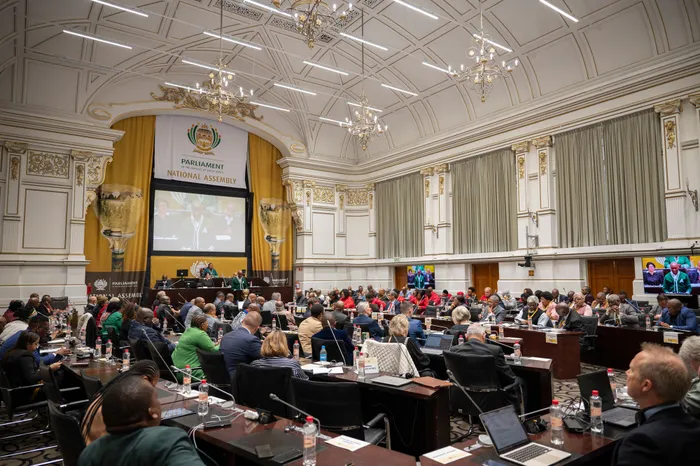Parliament at a crossroads as budget vote approaches

The National Assembly Programme heard that individual budget votes of departments will have to be passed by the National Assembly next week otherwise the Appropriation Bill will be sent back to the standinng committee for further processing
Image: Photographer: Armand Hough / Independent Newspapers
Parliament is at a crossroads on the passing of the budget for 2025/26 just six days before the National Assembly adopts the Appropriations Bill.
This takes place as the second biggest party in the Government of National Unity (GNU), the DA, has threatened not to vote for the budget votes of those ministers they deem are compromised and should be axed from the Cabinet.
The Appropriation Standing Committee is set to adopt its report on Friday ahead of the passing of the bill by the National Assembly on Wednesday, before the bill is sent to the National Council of Provinces for concurrence.
Briefing the Programme Committee on Thursday, National Assembly secretary Masibulele Xaso took the chief whips of political parties on the four steps to be followed when the bill is passed next week.
Xaso said once the Standing Committee on Appropriation has submitted its report on the bill, the House will first consider that report and thereafter the bill.
“After the report is considered, we then move to the First Reading of the bill. After the First Reading of the bill, we'll do the departmental votes and after the departmental votes, we then do the schedule.”
Xaso also said if the National Assembly rejected the First Reading of the bill, it rejected the bill.
“The House may consider to pass, amend, or reject any legislation before it. Any legislation means any legislation. So in this context, on the first reading of the appropriation book, the process ends there,” he said.
Xaso stated that when the House passed the First Reading of the bill, MPs will consider the departmental votes, one by one.
Where there was no agreement on all the votes, the bill will be recommitted to the committee for amendments.
“The vote, together with the bill, must then be referred to the Standing Committee on Appropriation for further processing. So in that event, we will then not proceed to take a decision on the schedule. We will not proceed to take a decision on the Second Reading of the bill.”
He also said should the Second Reading of the bill not be agreed, and then the bill will be rejected.
“It won't go back to the committee because the bill would be dead in the parliamentary process. It would mean the bill must be reintroduced into the system,” Xaso said.
EFF MP Hlengiwe Mkhaliphi enquired whether there will be fresh elections should the bill not be passed.
“If we take the bill to the committee to process, the fact of the matter is that it will mean that we as Parliament failed to pass the budget. Does that mean, if Parliament fails to budget, we must go to elections?” Mkhaliphi asked.
In response, Xaso said the House must proceed with First Reading of the bill and once it was rejected, the process ended there.
“The bill, at that level, must go to committee to look at the nature of amendments and implications and come to the House with a report,” added Xaso.
MK Party MP Visvin Reddy said the law states that if the budget can’t be passed, there should be fresh elections.
“That is what the law says. Why try to second guess the law. It is like trying to fit a puzzle where it can’t fit.”
Reddy urged that the law be looked into its raw form and follow it.
“If the law says we can’t pass the budget so be it let's go for fresh elections.”
But, national Assembly Speaker Thoko Didiza said there were rules on how to run the parliamentary business.
“We need to look our rules as the National Assembly,” Didiza said.
MPs heard that the budget must be passed within four months in the new financial year, which is end of July.
Parliamentary legal advisor Frank Jenkins indicated that the Public Finance Management Act sets out how government can spend prior to budget being approved.
Jenkins said in the first four months the government can spend 45% of budget equivalent to previous year budget and thereafter 10% each month.
“If funds are used prior to budget, the funds are used for existing programmes. Money is going to be deducted when the budget is finally passed.”
However, Jenkins said the implied motion of no confidence, when a budget was not passed eliciting elections, was not applicable in South Africa as the constitution provided for dissolution of Parliament when its term expired and by resolution after three years after the lections.
“The Constitution does not envisage in the first or second year after the elections,” Jenkins said.
mayibongwe.maqhina@inl.co.za
Related Topics: